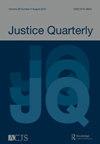大规模监禁让美国人感到不那么害怕了吗?累积监禁与个人恐惧感的多层次分析
IF 2.6
1区 社会学
Q1 CRIMINOLOGY & PENOLOGY
引用次数: 0
摘要
许多促进大规模监禁的政治言论都是基于减少公众恐惧的承诺。然而,目前尚不清楚的是,许多地区监禁人数的大幅增加是否让居民感到不那么害怕了。我们通过综合社会调查(GSS)的监禁地理数据和个人层面的恐惧数据来研究这个问题。我们发现,来自“累计监禁”率较高的州和县的人们的恐惧程度并不比来自囚犯少得多的地区的人们低。这些发现适用于所有公众,也适用于非拉丁裔白人以及工人阶级和中产阶级,他们经常是将大规模监禁时代的政策与减少恐惧联系起来的政治言论的目标受众。我们的研究支持越来越多的呼吁,即将犯罪和刑事司法政策与政治和选举周期脱钩,并围绕透明的规范原则制定基于证据的惩罚方法。本文章由计算机程序翻译,如有差异,请以英文原文为准。
Did Mass Incarceration Leave Americans Feeling Less Afraid? A Multilevel Analysis of Cumulative Imprisonment and Individual Perceptions of Fear
Abstract Much of the political rhetoric that facilitated mass incarceration was predicated on the promise of reducing fear among the public. Yet, it remains unclear whether the large increases in imprisonment experienced in many areas made residents feel less afraid. We examine this issue by integrating geographic data on imprisonment with individual-level data on fear from the General Social Survey (GSS). We find that people from states and counties with greater “cumulative imprisonment” rates were no less afraid than their counterparts from areas that imprisoned many fewer people. These findings hold for the public overall and for non-Latino whites and members of the working and middle classes, who frequently were target audiences for political rhetoric linking mass incarceration era policies to fear reduction. Our study supports growing calls to decouple crime and criminal justice policy from politics and electoral cycles, and to develop evidence-based punishment approaches organized around transparent normative principles.
求助全文
通过发布文献求助,成功后即可免费获取论文全文。
去求助
来源期刊

Justice Quarterly
CRIMINOLOGY & PENOLOGY-
CiteScore
6.90
自引率
6.20%
发文量
44
期刊介绍:
Justice Quarterly (JQ) is an official publication of the ACJS. JQ is a refereed, multi-disciplinary journal that publishes theoretical, empirical and interpretive studies of issues related to criminal justice. JQ is indexed in Criminology and Penology Abstracts, Police Science Abstracts, Criminal Justice Periodical Index, and Criminal Justice Abstracts. In the past decade, JQ has become a premier journal and it continues to be a major forum for criminal justice related scholarship, making it an essential part of any library"s holdings.
 求助内容:
求助内容: 应助结果提醒方式:
应助结果提醒方式:


